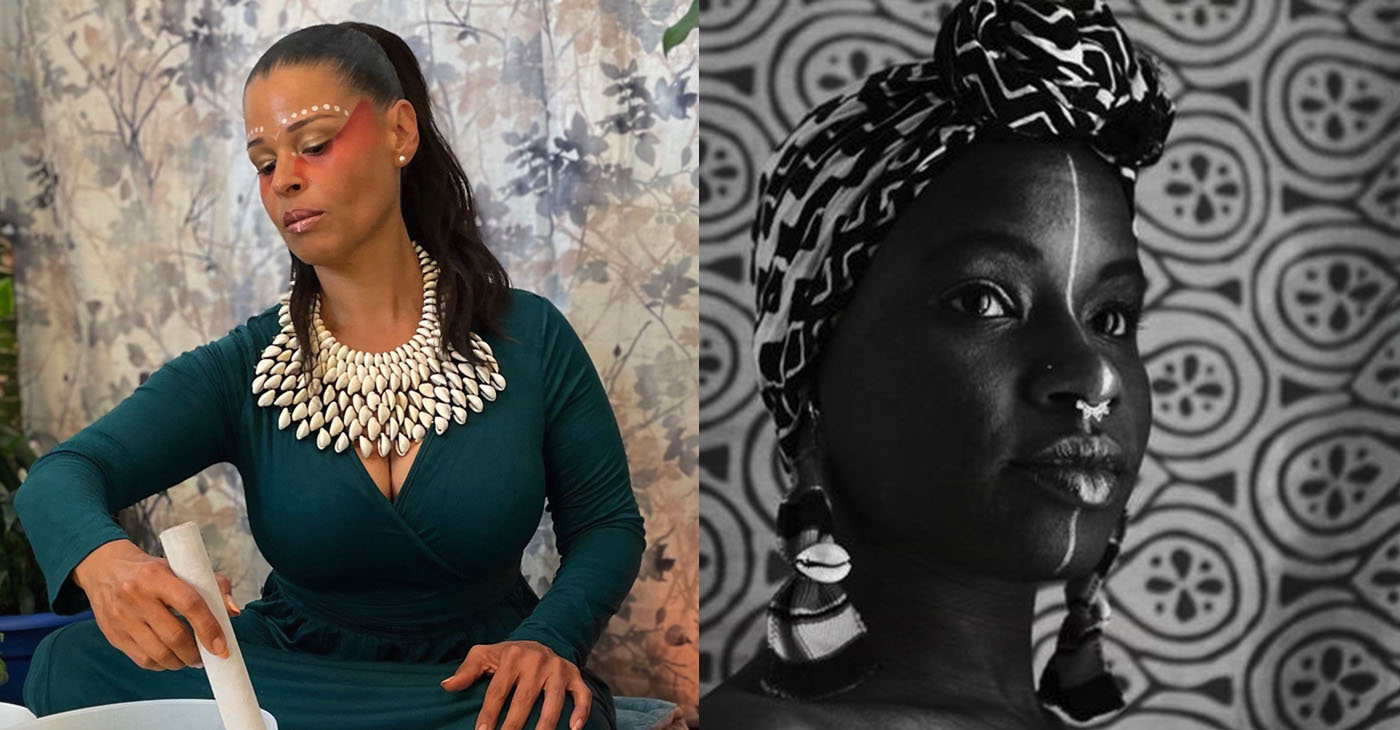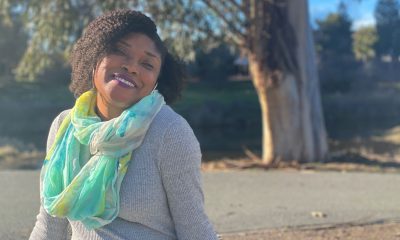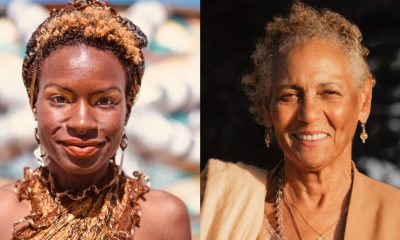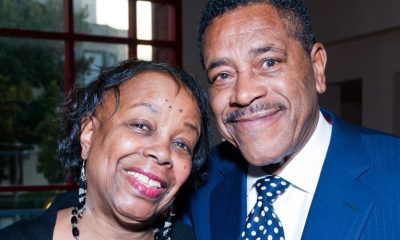Activism
Acknowledging Our Ancestars is Good for Our Souls
Ancestors are those in our maternal and paternal bloodlines born before us (in most cases) who have transitioned from the Earth to an invisible-spiritual-sky realm. We use ancestors interchangeably with Ancestars to honor some African ancients’ belief that our dearly departed return to the stars from which they came once they leave the Earth.

By Daktari S. Hicks, PsyD and
Monique “Kiki” Lyons, MA, AMFT
Except for some ceremonial moments and times, i.e., Kwanzaa, Juneteenth, Memorial Day, etc., we don’t think a lot about our ancestors.
Most of the time, in fact, we don’t think about those who walked in life before us and left footsteps for us to follow.
In many cases, we just bury them six feet under; or we cremate their physical bodies and scatter their ashes in a body of water or house them in an urn.
But are the dead really dead? As Black psychologists, we think not. The master Congo Nganga Dr. K. Kia Bunseke Fu-Kiau has taught us that we are seeds in a seed, from a seed, in a seed, from a seed ad infinitum.
We come and go and return and go and come back and go and come continually. As Black psychologists, we do believe in the continued existence, spirit, and power of our Ancestors, the invisible ones, or the dwellers of heaven (the sky world).
Ancestors are those in our maternal and paternal bloodlines born before us (in most cases) who have transitioned from the Earth to an invisible-spiritual-sky realm. We use ancestors interchangeably with Ancestars to honor some African ancients’ belief that our dearly departed return to the stars from which they came once they leave the Earth.
Us Black folk also adopt chosen, non-blood related Ancestors due to their vital impacts on us while they were alive and long after they’ve gone. Ibaye (“blessings to ancestor”) Sir Duke Ellington, Marvin Gaye, Chuck Brown, and Billy Stewart, a few of our Chocolate City-DC ancestors, where Dr. Daktari was born and raised.
Ibaye Monica Renee Hastings-Smith, Dr. “Papa” Zakariya Diouf, Zeke Nealy, Kamau Amen-Ra, and Dr. Angelina Graham, some of our local Oakland community Ancestors.
Nana Peasant, a character from Julie Dash’s film “Daughters of the Dust” says, “The Ancestors and the womb … they’re One, they’re the same. Those in the grave, like those who’re across the sea, they’re with us. They’re all the same. The Ancestors and the womb are one … Call on those old Africans. They’ll come to you when you least expect them. They’ll hug you up quick and soft like the warm, sweet wind. Let those old souls come into your heart. Let them feed your head with wisdom that ain’t from this day and time.”
Our Ancestars are vital because they serve as ever-present driving forces that guide and direct us on our divine paths.
An African proverb states, “A wise will is dedicated to the Ancestors, for it’s them who gave you everything.”
With that notion in mind, we inherit the good, bad, ugly, and phenomenal from our ancestors via genetic, familial, psychical, spiritual, cultural, and social modes of transmission. Within our collective ancestral memory bank, we can tap into intergenerational memories/stories of distant Ancestors that impact how we think, feel, and act yesterday, today, and tomorrow.
We co-authors crossed paths in 2017 when our ancestors deemed it necessary while attending an ancestral veneration ceremony at Oya Nike’s Botanica in Berkeley, CA, led by Curandero/Santero/Palero Baba Ruben Texidor.
We continued along our shared ancestral journey in 2019 by participating in Lead to Life’s Guns to Shovels Ceremony at Oakland City Hall where we erected altars for the ancestors, drummed/danced for the orishas (deified ancestors in the Yoruba tradition), and witnessed fireworkers meld guns (used to take lives) into shovels, which were used to plant trees on reclaimed local Ohlone land.
Via public/private communal ceremonies, we learned to cultivate ancestral healing. We acknowledge, communicate, and collaborate with our beloved Ancestars in an effort to resolve their unresolved trauma and access our inherited legacies of dynamism, resilience, revitalization, spirituality, and vitality.
The ancestors are, in fact, you. Acknowledging our ancestors is to honor the best of ourselves. We are the ancestors come to complete what they left incomplete, to finish the song, to finish the dance step, to finish their task, to finish our elevation and affirmation.
We encourage you to reach out, connect with, and honor your ancestors for reciprocal rejuvenation by creating an ancestral altar in your home/community, offering them omi tutu (fresh water), giving them their flowers, cooking their favorite meal, playing their favorite songs, and paying attention to your dreams, which are the “voices of Ancestors.”
We also invite you to attend the Annual Maafa Commemoration Sunrise Ceremony at Ocean Beach, which typically occurs on the second Sunday of every October.
The Association of Black Psychologists (ABPsi) Bay Area Chapter is committed to providing the Post Newspaper readership with monthly discussions about critical issues in Black Mental Health. The ABPsi-Bay Area Chapter is a healing resource. Readers are welcome to join us at our monthly chapter meetings every 3rd Saturday via Zoom. We can be contacted at bayareaabpsi@gmail.com.
Activism
Oakland Post: Week of April 24 – 30, 2024
The printed Weekly Edition of the Oakland Post: Week of April 24 – 30, 2024

To enlarge your view of this issue, use the slider, magnifying glass icon or full page icon in the lower right corner of the browser window. ![]()
Activism
Oakland Post: Week of April 17 – 23, 2024
The printed Weekly Edition of the Oakland Post: Week of April 17 – 23, 2024

To enlarge your view of this issue, use the slider, magnifying glass icon or full page icon in the lower right corner of the browser window. ![]()
Activism
Oakland Schools Honor Fred Korematsu Day of Civil Liberties
Every Jan. 30, OUSD commemorates the legacy of Fred Korematsu, an Oakland native, a Castlemont High School graduate, and a national symbol of resistance, resilience, and justice. His defiant stand against racial injustice and his unwavering commitment to civil rights continue to inspire the local community and the nation. Tuesday was “Fred Korematsu Day of Civil Liberties and the Constitution” in the state of California and a growing number of states across the country.

By Post Staff
Every Jan. 30, OUSD commemorates the legacy of Fred Korematsu, an Oakland native, a Castlemont High School graduate, and a national symbol of resistance, resilience, and justice.
His defiant stand against racial injustice and his unwavering commitment to civil rights continue to inspire the local community and the nation. Tuesday was “Fred Korematsu Day of Civil Liberties and the Constitution” in the state of California and a growing number of states across the country.
One OUSD school is named in his honor: Fred T. Korematsu Discovery Academy (KDA) elementary in East Oakland.
Several years ago, founding KDA Principal Charles Wilson, in a video interview with anti-hate organization “Not In Our Town,” said, “We chose the name Fred Korematsu because we really felt like the attributes that he showed in his work are things that the children need to learn … that common people can stand up and make differences in a large number of people’s lives.”
Fred Korematsu was born in Oakland on Jan. 30, 1919. His parents ran a floral nursery business, and his upbringing in Oakland shaped his worldview. His belief in the importance of standing up for your rights and the rights of others, regardless of race or background, was the foundation for his activism against racial prejudice and for the rights of Japanese Americans during World War II.
At the start of the war, Korematsu was turned away from enlisting in the National Guard and the Coast Guard because of his race. He trained as a welder, working at the docks in Oakland, but was fired after the bombing of Pearl Harbor in 1941. Fear and prejudice led to federal Executive Order 9066, which forced more than 120,000 Japanese Americans out of their homes and neighborhoods and into remote internment camps.
The 23-year-old Korematsu resisted the order. He underwent cosmetic surgery and assumed a false identity, choosing freedom over unjust imprisonment. His later arrest and conviction sparked a legal battle that would challenge the foundation of civil liberties in America.
Korematsu’s fight culminated in the Supreme Court’s initial ruling against him in 1944. He spent years in a Utah internment camp with his family, followed by time living in Salt Lake City where he was dogged by racism.
In 1976, President Gerald Ford overturned Executive Order 9066. Seven years later, the 9th Circuit Court of Appeals in San Francisco vacated Korematsu’s conviction. He said in court, “I would like to see the government admit that they were wrong and do something about it so this will never happen again to any American citizen of any race, creed, or color.”
Korematsu’s dedication and determination established him as a national icon of civil rights and social justice. He advocated for justice with Rosa Parks. In 1998, President Bill Clinton gave him the Presidential Medal of Freedom saying, “In the long history of our country’s constant search for justice, some names of ordinary citizens stand for millions of souls … To that distinguished list, today we add the name of Fred Korematsu.”
After Sept. 11, 2001, Korematsu spoke out against hatred and discrimination, saying what happened to Japanese Americans should not happen to people of Middle Eastern descent.
Korematsu’s roots in Oakland and his education in OUSD are a source of great pride for the city, according to the school district. His most famous quote, which is on the Korematsu elementary school mural, is as relevant now as ever, “If you have the feeling that something is wrong, don’t be afraid to speak up.”
-

 Activism4 weeks ago
Activism4 weeks agoOakland Post: Week of March 27 – April 2, 2024
-

 #NNPA BlackPress4 weeks ago
#NNPA BlackPress4 weeks agoBeloved Actor and Activist Louis Cameron Gossett Jr. Dies at 87
-

 Community2 weeks ago
Community2 weeks agoFinancial Assistance Bill for Descendants of Enslaved Persons to Help Them Purchase, Own, or Maintain a Home
-

 Activism3 weeks ago
Activism3 weeks agoOakland Post: Week of April 3 – 6, 2024
-

 Business2 weeks ago
Business2 weeks agoV.P. Kamala Harris: Americans With Criminal Records Will Soon Be Eligible for SBA Loans
-

 Activism2 weeks ago
Activism2 weeks agoOakland Post: Week of April 10 – 16, 2024
-

 Community2 weeks ago
Community2 weeks agoAG Bonta Says Oakland School Leaders Should Comply with State Laws to Avoid ‘Disparate Harm’ When Closing or Merging Schools
-

 Community1 week ago
Community1 week agoOakland WNBA Player to be Inducted Into Hall of Fame


















































